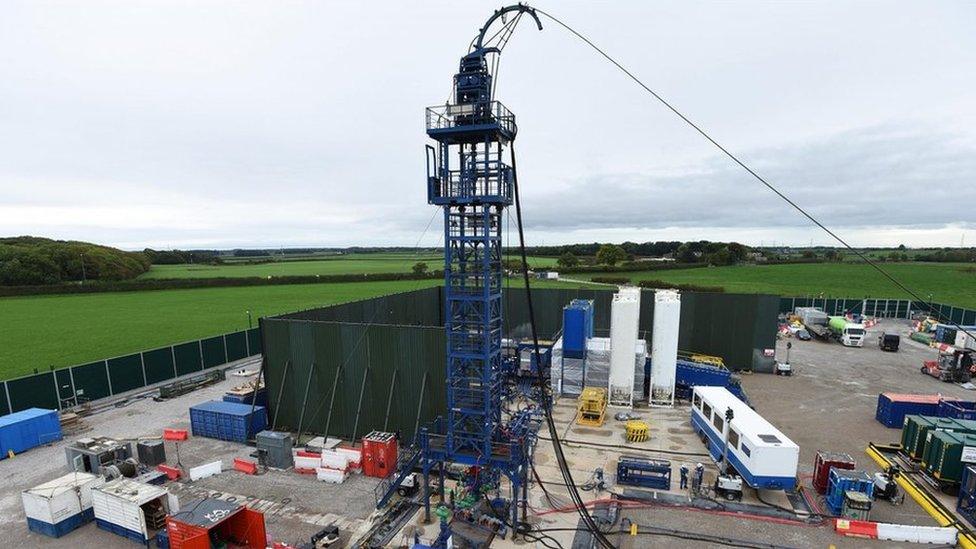Fracking: Jacob Rees-Mogg faces Tory anger over plan to buy local support
- Published
- comments
Jacob Rees-Mogg says it is "important" to use all available sources of fuel within the UK rather than import them.
The government is facing a backlash from its own MPs over its decision to lift a ban on fracking in England.
Business Secretary Jacob Rees-Mogg promised local people would be consulted before fracking gets under way in their area.
He declined to say how they would be asked, but claimed that fracking would become popular if drilling firms paid residents for the "inconvenience".
He faced claims he was trying to buy people off, in a heated Commons debate.
He told MPs: "We should not be ashamed of paying people who are going to be the ones who don't get the immediate benefit of the gas but have the disruption."
Pressed further on whether consent would be obtained through local referendums or the planning process, Mr Rees-Mogg said: "It will be a matter that is dealt with in a governmental way."
Tory MP Mark Fletcher said it appeared communities would be "bought off" to allow fracking - a technique for recovering gas and oil from shale rock - under the government's plans.
The MP for Bolsover, a former Labour stronghold in Derbyshire, said: "I've listened carefully to the secretary of state and I have to say the local consent plans don't seem to wash.
"It seems to come back to communities being bought off rather than having a vote."
'Dangerous fantasy'
A number of cabinet ministers have expressed opposition to fracking in the past, including Chancellor Kwasi Kwarteng who told the Daily Mail earlier this year, external: "Even if we lifted the fracking moratorium tomorrow, it would take up to a decade to extract sufficient volumes - and it would come at a high cost for communities and our precious countryside."
A string of Tory, Labour and Lib Dem MPs with potential fracking sites in their constituencies joined in with the criticism, in the House of Commons.
The Tory MP for Rushcliffe, Ruth Edwards, said: "I have many concerned constituents who want to know that they have a genuine route to rejecting fracking applications that don't have local support, and I'm still not clear what that would be."
And Scott Benton, Tory MP for Blackpool South, said: "My constituents are understandably anxious about fracking returning to the Fylde coast."
Labour's shadow climate change secretary Ed Miliband, who secured an urgent question in Parliament on the issue, described fracking as a "dangerous fantasy" and accused Mr Rees-Mogg of "creating a charter for earthquakes".
"We now have an energy policy run for big fossil fuel interests not for the British people. No to the windfall tax and yes to dangerous, unsafe fracking," he said.
'Any potential sources'
Mr Rees-Mogg said fracking was in the national interest and would make the country richer - and he accused Mr Miliband and others who spoke out against it of being "luddites".
He suggested current limits on acceptable levels of seismic activity are too restrictive and said the government is determined to "realise any potential sources of domestic gas".
Regulations require work to stop if tremors above 0.5 on the Richter scale are detected, but Mr Rees-Mogg said he wanted that lifted potentially to 2.5.
"There are millions of seismic events of 2.5 or lower in the world every year, we should not assume that every seismic event is the San Francisco earthquake."
But Conservative former minister Sir Greg Knight told MPs the risks of shale gas exploration were an "unknown quantity" and "the occurrence of seismic events as a result of fracking remains a challenge to the experts".
He added: "The safety of the public is not a currency in which some of us choose to speculate."

Cuadrilla's hydraulic fracturing site at Preston New Road, Lancashire
Mr Jacob Rees-Mogg said there was no evidence fracking was "worse" than coal mining or oil extraction, which were not subject to the same limitations.
While fracking was halted in 2019, amid opposition from environmentalists and local concerns, Prime Minister Liz Truss has backed fracking as a way to help boost the UK's domestic gas supplies during a time of skyrocketing energy prices.
She pledged that local support would be needed for sites to go ahead - and the Conservative manifesto for the 2019 general election said fracking would only be reconsidered if "the science shows categorically that it can be done safely".
'Scientific challenge'
Fracking in the UK has been a controversial subject within local communities and amongst MPs due to its association with minor earthquakes.
In 2019, at oil and gas exploration company Cuadrilla's fracking site in Lancashire, more than 120 tremors were recorded, external - although most were too small to be felt.
Alongside the announcement on Thursday the government published a new review, external, commissioned in April, from the British Geological Survey (BGS) which considers any changes to the science around the practice.
On the risk of larger tremors from fracking, the report concludes: "Forecasting the occurrence of large earthquakes… remains a scientific challenge for the geoscience community."
Within shale rock there can be small faults and areas of stress. During drilling, water is injected into the rock to extract the gas. The water lubricates the shale rock, moving parts of the rock along these faults, and this movement can trigger a tremor.